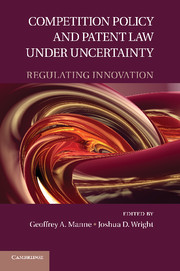Book contents
- Frontmatter
- Contents
- Contributors
- Introduction
- PART I THE INSTITUTIONS OF GROWTH
- PART II THE ECONOMICS OF INNOVATION
- PART III INNOVATION AND COMPETITION POLICY
- PART IV THE PATENT SYSTEM
- PART V PROPERTY RIGHTS AND THE THEORY OF PATENT LAW
- PART VI INTELLECTUAL PROPRETY AND ANTITRUST: THE REGULATION OF STANDARD-SETTING ORGANIZATIONS
- 15 Increments and Incentives
- 16 What's Wrong with Royalties in High-Technology Industries?
- 17 Federalism, Substantive Preemption, and Limits on Antitrust
- Index
- References
15 - Increments and Incentives
The Dynamic Innovation Implications of Licensing Patents under an Incremental Value Rule
Published online by Cambridge University Press: 05 June 2012
- Frontmatter
- Contents
- Contributors
- Introduction
- PART I THE INSTITUTIONS OF GROWTH
- PART II THE ECONOMICS OF INNOVATION
- PART III INNOVATION AND COMPETITION POLICY
- PART IV THE PATENT SYSTEM
- PART V PROPERTY RIGHTS AND THE THEORY OF PATENT LAW
- PART VI INTELLECTUAL PROPRETY AND ANTITRUST: THE REGULATION OF STANDARD-SETTING ORGANIZATIONS
- 15 Increments and Incentives
- 16 What's Wrong with Royalties in High-Technology Industries?
- 17 Federalism, Substantive Preemption, and Limits on Antitrust
- Index
- References
Summary
A number of recent policy papers have called for patents to be priced according to a so-called incremental value rule, where licensing fees would be restricted to the value the patent adds as compared to licensees' next best alternative. Incremental value pricing is a common approach for physical goods and services, but intellectual property is different in a number of important ways. We evaluate the proposal to cap licensing fees at the incremental value of the patent. We find that while the incremental value rule has intuitive appeal, it is based on ex post reasoning in that it relies on the presumption that all needed innovations have already been developed. We consider the dynamic implications of the innovation process, assessing how the imposition of an incremental value licensing cap would impact a firm's decisions to invest in R&D and, when relevant, to participate in cooperative standard-setting efforts. Shifting the analysis to fully ex ante, before either licensors or licensees have made any irreversible investments, we find imposing an incremental value cap on licensing fees would lower R&D investments among innovators, it would lower SSO participation rates among patent holders, and it would even lower aggregate earnings for SSO members as a whole.
Introduction
A fundamental result in economics is that a firm facing competition for a particular product will be able to charge at most the incremental value that the product offers to customers over the next best alternative.
- Type
- Chapter
- Information
- Competition Policy and Patent Law under UncertaintyRegulating Innovation, pp. 443 - 461Publisher: Cambridge University PressPrint publication year: 2011
References
- 2
- Cited by



